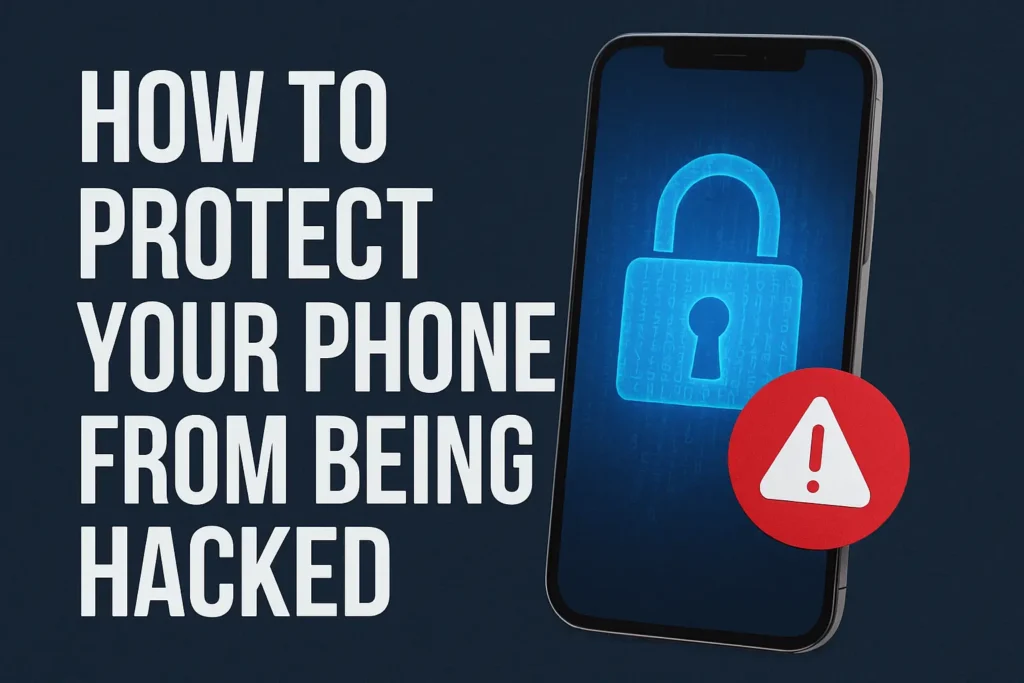In today’s digital world, your smartphone is more than just a device — it’s your personal assistant, wallet, camera, and storage of memories. But with all that valuable data in one place, hackers see it as a goldmine. Knowing how to protect your phone from being hacked is no longer optional — it’s essential.
Whether you use Android or iPhone, mobile hacking attempts are growing daily. Cybercriminals use phishing links, fake apps, and public Wi-Fi traps to steal passwords, photos, or banking details. So, let’s look at practical, easy-to-follow steps to keep your smartphone secure.

Table of Contents
Type 1 :- Keep Your Phone Software Up to Date
The simplest way to protect your phone from being hacked is by regularly updating your software. Both Android and iOS updates come with security patches that fix newly discovered vulnerabilities.
Delaying updates gives hackers more time to exploit older versions. So, whenever you see a software update notification, don’t ignore it — it’s your first shield against mobile hackers.
Type 2 :- Download Apps Only from Trusted Sources
One of the easiest ways hackers get into your phone is through malicious apps. Always install apps only from the Google Play Store or Apple App Store. Avoid downloading APK files or apps from third-party websites, as they may carry hidden malware.
Before downloading, read reviews and check the developer’s name. If an app requests unnecessary permissions (like camera or microphone access for a calculator), it’s a red flag. Stay cautious to protect your phone from hackers who disguise malware as useful tools.
Type 3 :- Use Strong Passwords and Biometric Lock
A weak or repeated password is an open invitation for hackers. Use complex passwords that combine letters, numbers, and special symbols. Avoid easy-to-guess details like birthdays or names.
Additionally, enable biometric security such as fingerprint or facial recognition. It adds an extra layer of protection, making it much harder for anyone to unlock your phone even if they have physical access.
Type 4 :- Avoid Public Wi-Fi Networks
Public Wi-Fi might look convenient, but it’s also a hotspot for hackers. When you connect to open Wi-Fi in coffee shops or airports, your data can be intercepted easily.
If you must use public Wi-Fi, avoid logging into banking or shopping apps. A safer option is using a VPN (Virtual Private Network) to encrypt your internet connection and hide your data from potential attackers.
Type 5 :- Turn Off Bluetooth and Location When Not in Use
Keeping your Bluetooth and location services on all the time gives hackers another entry point. Bluetooth exploits can allow unauthorized devices to connect to your phone. Similarly, location tracking can be used to monitor your movements.
Turning these features off when they’re not needed can significantly reduce the risk of being hacked.
Tpe 6 :- Don’t Click on Unknown Links or Messages
Phishing is one of the most common hacking techniques. Hackers send fake messages, emails, or social media links that look genuine but are designed to steal your information.
If you receive a suspicious message asking you to “verify your account” or “claim a prize,” don’t click. Delete it immediately. Always check the sender’s email or number before taking action.
Type 7 :- Install a Reliable Mobile Security App
A trustworthy antivirus or mobile security app can help detect and block malware before it does harm. Look for reputable options like Norton Mobile Security, Bitdefender, or Avast Mobile Security.
These apps scan for malicious files, prevent phishing, and even help locate your phone if it’s lost or stolen. Investing in one is a smart move to protect your phone from being hacked.
Type 8 :-Regularly Backup Your Data
Even with all precautions, no system is 100% secure. Backing up your phone data ensures that if anything goes wrong — whether from hacking or damage — you won’t lose your important files. Use Google Drive, iCloud, or other secure cloud services for regular backups.
Final Thoughts
Your smartphone carries your digital life — personal chats, photos, passwords, and payment details. Taking a few security steps can make all the difference.By updating your software, avoiding suspicious apps, using strong passwords, and being mindful of online behavior, you can effectively protect your phone from being hacked and keep your data safe.